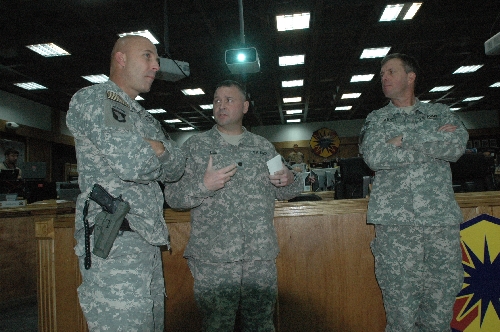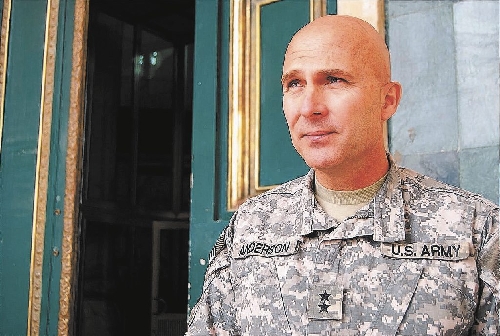U.S. officer notes progress, problems


BAGHDAD — At a palace on an artificial lake, Maj. Gen. Joseph Anderson works on the intricacies of the U.S. withdrawal from Iraq seven years after he came in commanding troops at the start of the war that toppled the palace’s former owner.
Anderson’s deployments have been bookended by the beginning and eventual end of the war with more than a few twists and turns in between.
As a brigade commander with the 101st Airborne Divisionunder then-Maj. Gen. DavidPetraeus, Anderson and his unit made their way from Kuwait all the way to the northern city of Mosul after the initial assault.
A few months later, the initial calm in Iraq’s third largest city gave way to an insurgency that foreshadowed many of the problems still raging in this country.
He lost 32 soldiers under his command. For Anderson, those volatile days in Mosul and two other deployments that have followed here as chief of staff to Gen. Raymond Odierno, the commanding general in Iraq, have given him a vantage point on where Iraq has come and how far it still needs to go. Anderson referred to declining levels of violence, particularly sectarian violence, from one to two years ago and the increasing capability of Iraqi government ministries and the Iraqi parliament after the first national election in 2005.
"If you look at all these ministries, what the council of representatives has done, what the council of ministers has done, I would say we’ve come a long way," said Anderson in an interview in his office at Faw palace, the U.S. military headquarters on the outskirts of Baghdad.
"You have to know where it came from to know where we are today.
"It’s not perfect. It’s far from perfect," said Anderson, a former Army ranger known for his candor. "There are going to be friction points."
Those friction points include a majority Shiite Arab country in a largely Sunni Arab region, an ethnic mix of competing interests let loose when Saddam Hussein was toppled. In Mosul and points farther north, tension between Kurds suppressed by Saddam, Sunni Arabs and significant minorities of Turkmen and other ethnic groups make up the fault line that most worries U.S. commanders and other officials.
Kurdish-Arab tensions are "a driving force that is going to continue to hamper unity," said Anderson, who has been a key part of an effort to establish joint patrols and coordination centers involving Kurdish and Arab forces and U.S. troops as a confidence-building measure in the disputed territories.
The real test of the March 7 elections for parliament will be whether it will lead to a government less divided along sectarian lines that will be able to put qualified people in key government posts and cut down on corruption, he said.
Under a quota system set up under U.S. occupying authorities, government ministries were divided among major political parties.
When the health ministry was controlled by the party loyal to radical Shiite cleric Muqtada al-Sadr for instance, many Sunnis were afraid to go to government hospitals. Even now, ordinary Iraqis complain that being from the wrong sect or ethnic group makes it almost impossible to get things done at ministries controlled by specific parties.
"How much will this election set a path for the future being nonsectarian: That’s what we have to see," said the Westchester County, New York, native and West Point graduate.
This parliament, only the second elected since 2003, will have to deal with some of Iraq’s biggest questions: how to share power, land and oil revenue after decades of oppression under Saddam.
After a series of high-profile suicide bombings that killed hundreds of Iraqis since August and threats to disrupt the vote, election day passed relatively calmly by Iraqi standards. About 40 Iraqis were killed in attacks, many of them in Baghdad when two houses collapsed because of explosions. A series of other explosions turned out to be what military officials describe as ineffective sound bombs made by packing explosives into water bottles.
For Anderson, who served in 2005 as executive officer to the secretary of the Army, one of the biggest changes since 2003 is among Iraqi security forces.
In the early days, Iraqi civil defense forces quickly thrown together by U.S. forces trained in plastic sandals, without ammunition, many of them unable to read or write. When the insurgency gathered steam and al-Sadr’s Mahdi army rose up, many of them melted away. Some joined the other side.
Despite lingering logistics and other problems, the new Iraqi army is for the most part a professional force loyal to the state rather than their own party leaders. The Iraqi police although uneven in many places, has also made huge improvements.
Al-Qaida in Iraq, although significantly weakened, remains a major threat in its attempts to destabilize the government.
"The issue becomes how do we attack the network that facilitates that which is a huge issue, and how do we protect the populace from that," Anderson said. He said the answer is continuing to improve the ability of Iraqi security forces to provide protection, to investigate attacks when they take place and to bring people to justice.
Asked what he thinks the biggest mistake of the war has been, Anderson said he believed it was dismantling the Iraqi army after Saddam was toppled.
The move by U.S. occupation authorities threw hundreds of thousands of Iraqi army officers and soldiers out of work, including more than 1,000 army generals in the Mosul area alone. It was widely believed to have fueled the Iraqi insurgency.
"We’re probably still paying for the removal of all the Iraqi security forces back in ’03," Anderson said. He said the second major mistake was the way in which the Baath party was banned and former members, many of them professionals who joined out of necessity, were barred from jobs in the government.
In a conflict that has shifted from conventional warfare to a belated realization that there was an active insurgency, Anderson and many others believe an earlier attempt by the United States to hand off to Iraqi forces before they were ready also set back efforts for stability.
"We had a lot of timelines being set around 2006 — (timelines for) Iraqi government control, Iraqi provincial control, Iraqi army in the lead, and we got away from partnering," he said. "We got removed from the population, which is what all got reversed in the surge."
The U.S. military surge three years ago, now being repeated in Afghanistan, placed tens of thousands more U.S. troops in vulnerable areas to protect the population, clear neighborhoods and cities of insurgents, and work with local security forces to hand off those areas to allow Iraqi troops to maintain stability. All of that was aimed at providing enough stability for elections to take place.
With the elections and a new government in place, the expectation is that the fewer than 100,000 U.S. troops in Iraq will continue to draw down until they are fewer than half that number by September and only a minimal presence after 2011.
In his current job, Anderson runs a staff of 2,250 focused on dealing with Iraqi leaders as well as the U.S. Embassy and the United Nations and other organizations that are playing a larger role as the U.S. military presence recedes.
Anderson, who is not prone to whitewashing the immense challenges still ahead, said a large part of managing the withdrawal is determining how much can be done in the time they have left on key issues such as coordinating counterterrorism efforts and efforts between government ministries.
"We are in a race against time to get those handed off which things will be completed and which will be terminated meaning we’re going to cut bait at some point and say we’re not going to get there. We are in that process daily," he said. "The capability varies in each ministry to hand things off–how do we ensure what our path is going to be these next 22 months now because it is coming down to the wire."
Drawing down the troops will also mean closing down the remaining bases that have become small, walled U.S. cities where the air-conditioning never fails and the dining facilities feature crab legs and ice cream bars.
It’s a long way from sleeping in Humvees in 100-degree heat and living on MREs and instant coffee dissolved in water bottles, which Anderson and others remember from 2003. At Camp Victory, Saddam’s former palace complex, he lives in a house on the lake with a barbecue and picnic table on the roof to smoke cigars, and a porch where he can drive golf balls.
"Over time bases started getting built and heaters showed up and fans showed up and now we live in pretty much continual electricity and big chow halls but now we’re shutting all that stuff down so we’re closing bases and taking away all those amenities and all that stuff is going to go away," he said.
Jane Arraf is a journalist based in Baghdad for the Christian Science Monitor. She previously served as CNN’s Baghdad bureau chief and senior correspondent.












